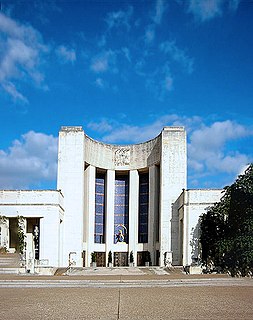
The George Washington University is a private research university in Washington, D.C. It was chartered in 1821 by an act of the United States Congress.

Foggy Bottom is one of the oldest late 18th- and 19th-century neighborhoods in Washington, D.C., located west of the White House and downtown Washington, in the Northwest quadrant. It is bounded roughly by 17th Street NW to the east, Rock Creek Parkway to the west, Constitution Avenue NW to the south, and Pennsylvania Avenue NW to the north.

The Hall of State is a building in Dallas's Fair Park that commemorates the history of the U.S. state of Texas and is considered one of the best examples of Art Deco architecture in the state. It was designed and built for the Texas Centennial Exposition.

The George Washington University Law School is the law school of George Washington University, in Washington, D.C. Established in 1865, GW Law is the oldest top law school in the national capital and a premier center of American legal education. GW Law boasts the nation's largest course offerings with 275 elective courses in business and finance law, environmental law, government procurement law, intellectual property law, international comparative law, litigation and dispute resolution, and national security and U.S. foreign relations law. Admissions are highly selective as the law school regularly receives the second largest volume of applications with an incoming class of 508 1Ls.

The Textile Museum is a museum of textile art in Washington, D.C. It is part of the combined George Washington University Museum and The Textile Museum on the university's main campus in Foggy Bottom. The museum was founded by collector George Hewitt Myers in 1925 and was originally housed in two historic buildings in D.C.'s Kalorama neighborhood: the Myers family home, designed by John Russell Pope, and an adjacent building designed by Waddy Wood. It reopened in March 2015 as part of George Washington University.

The Oscar W. Underwood House is a historic house located in the Foggy Bottom neighborhood Northwest, Washington, D.C.. It is nationally significant for its association with Major Archibald Butt,, and painter Francis Davis Millet, and also Alabama politician Oscar Underwood (1862-1929) who lived here 1914-25, also as the first long-term home of the Washington College of Law, the nation's first law school founded and run by women. It was declared a National Historic Landmark in 1976. The building presently houses a legal aid clinic operated by George Washington University.
The campus of the George Washington University (GW), originated on College Hill, a site bounded by 14th Street, Columbia Road, 15th Street and Florida Avenue, NW in Washington, DC. After relocating to the downtown financial district in the 1880s and then to Foggy Bottom in 1912, GW now has three campuses. Foggy Bottom is the location of the university's main campus in Washington, DC. Also in Washington's Foxhall neighborhood is the Mount Vernon Campus, formerly the Mount Vernon College for Women. Additionally, the George Washington University Virginia Campus is located in Ashburn, VA.
The George Washington University is one of the largest United States private universities in terms of enrollment. Almost 10,000 undergraduates attend George Washington. GW has residence halls on two of its three campuses. The Foggy Bottom campus is the university's main campus, where most of the residence halls can be found, in an urban setting. Also in Washington's Foxhall neighborhood is the Mount Vernon campus, formerly the Mount Vernon College for Women. The Mount Vernon campus provides a more suburban residential setting.

Lisner Auditorium is an auditorium located on the campus of The George Washington University, at 730 21st Street, Northwest, Washington, D.C.. It is named for Abram Lisner, a trustee of the University who donated the money for its construction.

The Maxwell Woodhull House is a historic residence located at 2033 G Street in Northwest Washington, D.C..

Lieutenant General George Washington is an 1860 equestrian statue of George Washington, at Washington Circle, at the edge of the George Washington University’s campus in Washington, D.C. The statue was sculpted by Clark Mills.

Munson Hall is a residence hall on the campus of George Washington University, located at 2212 Eye St., Northwest, Washington, D.C. in the Foggy Bottom neighborhood.

Corcoran Hall is an academic building on the campus of George Washington University in Washington, D.C. It was listed on the District of Columbia Inventory of Historic Sites in 1987 and the National Register of Historic Places in 1991.

Madison Hall, formerly known as the Flagler Apartments, is a residence hall on the campus of George Washington University (GW) in Washington, D.C. The building was designed by Stern and Tomlinson and was built in 1926. The building is representative of the apartment buildings that were built from the 1920s to the 1940s that have been acquired by the university and converted into dormitories. GW bought the building in 1957 and replaced its manually operated elevators during its renovations. The building was named for both James Madison and Dolley Madison. It was listed on the District of Columbia Inventory of Historic Sites and the National Register of Historic Places in 2010.

Jacqueline Bouvier Kennedy Onassis Hall is a residence hall on the campus of the George Washington University, in Washington, DC. It is named after GW alumna Jacqueline Bouvier Kennedy Onassis, former First Lady of the United States.

H.B. Burns Memorial Building, also known as Medical Faculty Associates, is a building on the campus of George Washington University in Washington, D.C.. It was listed on the District of Columbia Inventory of Historic Sites and the National Register of Historic Places in 2010 as The Keystone. The building is home to the George Washington University Medical Faculty Associates.

Stockton Hall is a building on the campus of George Washington University in Washington, D.C.. It was listed on the District of Columbia Inventory of Historic Sites in 1987 and on the National Register of Historic Places in 1991.

Hattie M. Strong Residence Hall is a women's dormitory on the campus of George Washington University in Washington, D.C.. It was listed on the District of Columbia Inventory of Historic Sites in 1987 and on the National Register of Historic Places in 1991.

Vare-Washington School, is a K-8 school in South Philadelphia, Pennsylvania. It is a part of the School District of Philadelphia. It occupies the former George Washington School building in the Dickinson Narrows neighborhood, in proximity to Southwark.

Robert O. Scholz (1895-1978) was an American architect from Washington, D.C., who is considered one of the city's most important Art Deco designers. A native of New York City, his German parents later moved to Chicago where he studied at the Armour Institute. Scholz briefly served during World War I before moving to Washington, D.C. He worked as an engineer and draftsman before starting his own architectural firm in 1922.



















